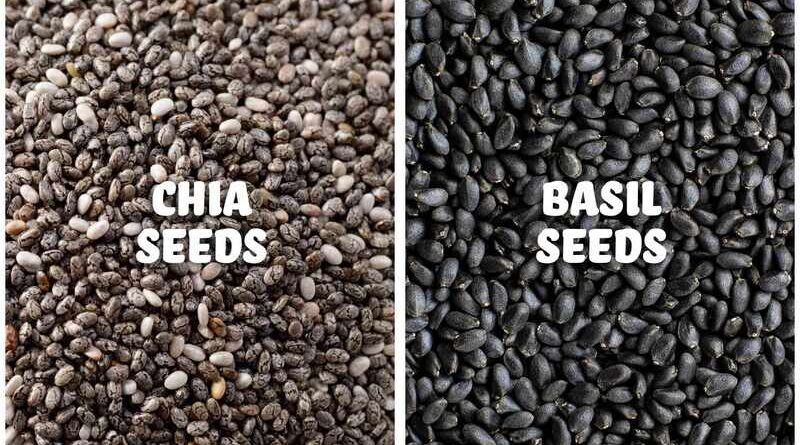Basil Seeds vs Chia Seeds: Which is the Better Choice?
Basil seeds vs chia seeds are two superfoods that are becoming more and more well-known for their health and culinary applications as well as their nutritional advantages. We will compare the nutritional profiles and health advantages of chia and basil seeds in this post as we examine their unique qualities.
When incorporating these two seeds into their diets, people can make more educated decisions if they are aware of their distinctions. We will examine the different facets of basil seeds versus chia seeds to highlight their distinct benefits and considerations, from culinary uses to possible adverse effects.
Overview of Basil Seeds
The sweet basil plant yields basil seeds, which are also referred to as sabja seeds or tukmaria. Soak these tiny black seeds in water, and they will expand up and produce a gelatinous outer shell. Due to their high fiber, vitamin, and mineral content, basil seeds are a common garnish for sweet and savory dishes as well as drinks.
Overview of Chia Seeds
Mexico and Guatemala are the original home of chia seeds, which are produced from the Salvia hispanica plant. Omega-3 fatty acids, protein, fiber, antioxidants, and a host of vitamins and minerals abound in these little seeds. Chia seeds are a popular ingredient in recipes because of their remarkable capacity to absorb moisture and create a gel-like consistency.
Nutritional Comparison: Basil Seeds vs Chia Seeds
Each has distinct nutritional advantages when it comes to basil and chia seeds. Chia seeds are notable for their high levels of protein and omega-3 fatty acids. Whilst basil seeds are high in fiber and some minerals. Both seeds are beneficial complements to a balanced diet since they provide several health benefits.
Health Benefits of Basil Seeds
Because they contain a significant amount of fiber, which can facilitate digestion and encourage bowel regularity, basil seeds are well known for their digestive advantages. Antioxidants included in these seeds may also aid in lowering inflammation and enhancing heart health.
Because of their calming qualities and ability to treat ailments like acidity and bloating. Basil seeds are frequently utilized in traditional medicine.
Health Benefits of Chia Seeds
Chia seeds are well known for their rich supply of omega-3 fatty acids. Which are essential for heart and brain health as well as for lowering inflammation in the body.
Chia seeds’ high fiber content can aid in weight management by promoting a sensation of fullness and supporting a healthy digestive system. Furthermore, chia seeds’ antioxidants may lower the chance of developing chronic illnesses and promote general health.
Basil Seeds vs Chia Seeds: A Culinary Showdown
The power couple of the seed world is comparable to basil and chia seeds in terms of their culinary applications and adaptability. When soaked, basil seeds, often referred to as sabja seeds. Provide a moderate flavor and distinctive texture that makes them a favorite addition to desserts and beverages.
Conversely, chia seeds add a nutty flavor and a gel-like consistency to liquids. Which makes them a flexible component in a range of dishes.
These little powerhouses can be used to increase the nutritious content of your meals or provide a burst of texture to your beverages (chia seeds to be exact).
How to Spice Up Your Diet with it?
It’s easy to include chia seeds and basil in your diet. For a lovely crunch, sprinkle some basil seeds over fruit salads, yogurt, and smoothie bowls. Chia seeds can be used as an egg substitute in vegan dishes. As well as a thickening agent in puddings and baked goods to offer an extra nutritious boost. There are countless options! Try incorporating these seeds into your dishes in various ways to enjoy their health benefits and improve your cooking.
Side Effects and Precautions
Despite the many health advantages of basil and chia seeds. It’s important to eat them in moderation and be mindful of any possible negative effects. Both seeds are heavy in fiber, which if taken in excess can lead to digestive problems including bloating or constipation.
Furthermore, before including these seeds in their diet, people with certain medical concerns or allergies should speak with their healthcare provider. Recall that a small amount of these powerful yet tiny seeds goes a long way; don’t use too many.
Are Chia or Basil Seeds Better?
There isn’t a certain winner in the matchup between chia and basil seeds. It all depends on your diet and personal preferences. Basil seeds can be your best bet if you’re searching for a mild flavor and an interesting texture.
Chia seeds, on the other hand, might become a new kitchen mainstay if you’re looking for a multipurpose, nutrient-dense seed. When you can have the best of both worlds, why make a choice?
Try experimenting with adding chia and basil seeds to your food and learn the countless benefits these small seeds can provide. Chewing pleasure!
Conclusion
In conclusion, basil seeds vs chia seeds both provide several culinary and health advantages. Both types of seeds can be beneficial additions to a well-balanced diet, whether you go with chia for its omega-3 fatty acids or basil for its fiber content.
You can improve your general health by making well-informed judgments by being aware of the unique benefits and factors to take into account with each seed. Try experimenting with adding chia and basil seeds to your favorite recipes and see for yourself the nutritional benefits they provide.
You Can Read More About Chia Seeds
A Beginners Guide: Ways to Enjoy Chia Seed Drinks
How to Make a Refreshing Chia Seeds and Lemon Water Drink?
The Ultimate Showdown: Hemp Seeds vs Chia Seeds in Smoothies
